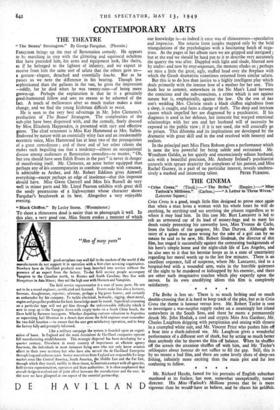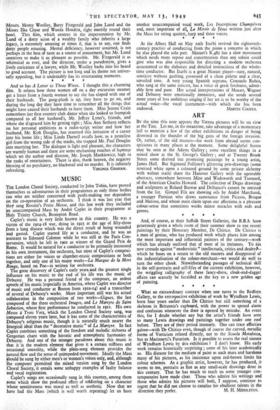THE CINEMA
"Criss Cross." (Tivoli.)—" The Bribe." (Empire.)—" Miss Tatlock's Millions.", (Carlton.)—" A Letter to Three Wives."
(Leicester Square.) Criss Cross is a good, tough little film designed to prove once again that when a man loves a woman with his whole heart he will do anything, be anything' and say anything she pleases regardless as to where it may lead him. In this case Mr. Burt Lancaster is led to rob an armoured car of its load of money-bags and to meet his death vainly protecting his unworthy love, Miss Yvonne de Carlo, from the bullets of the gangster, Mr. Dan Duryea. Although the story of a good man gone wrong for the sake of a girl can by no means be said to be new, Mr. Robert Siodmak, the director of this film, has staged it successfully against the contrasting backgrounds of his hero's simple home and the night-club life of Los Angeles, and he also sees to it that his heroine keeps us in a state of uncertainty regarding her moral worth up to the last few minutes. There is an excellent sequence, full of suspense, where Mr. Lancaster, tied to a hospital-bed with a wounded arm waits in the horrible quietness of the night to be murdered or kidnapped by his enemiec, and there are other such imaginative touches which play expertly upon the nerves. In its own Unedifying idiom this film is completely satisfactory. * * * *
The Bribe is less so.. There is se; much bribing and so much double-crossing that it is hard to keep track of the plot, but as in Criss Cross the theme is honour versus love. Mr. Robert Taylor is sent to investigate a war-surplus supply racket on a seemingly hot island somewhere in the South Seas, and there he meets a permanently drunk Mr. John Hodialty. a cool and cryptic Miss Ava Gardner Mr. Charles Laughton dripping with perspiration and oozing with slynesi. in a crumpled white suit, and Mr. Vincent Price who pushes him off a boat into a shark-infested sea. Mr. Laughton gives a wonderful performance of a different sort of shark, but by acting so much better than anybody else he throws the film off balance. When he shuffles off the screen the attention shuffles off with him, and Mr. Taylor's soliloquies about honour do not suffice to fill the gap. Still, this is by no means a bad film, and there are some lovely shots of deep-sea fishing, infinitely more exciting than the main plot and far less
confusing to follow. * .* * * Mr. Richard Haydn, famed for his portraits of English suburban manhood at its frailest, has now, somewhat unexpectedly, turned director. His Miss urallock's Millions proves that he is more vigorous than he would' have us believe, and he chases his goldfish. Messrs. Monty Woolley, Barry Fitzgerald and John Lund and the
• Misses Ilka Chase and Wanda Hendrix, right merrily round their bowl. This film, which centres in the impersonation by Mr. Lund of a dotty scion of a wealthy family who inherits a large ,legacy, is extremely amusing at times if, that is to say, one finds dotty people amusing. Mental deficiency, however assumed, is not perhaps in the best of taste as a source of amusement, but Mr. Lund contrives to make it as pleasant as possible. Mr. Fitzgerald is as whimsical as ever, and the director, under a pseudonym, gives a ilively caricature of a lawyer, while Mr. Woolley barks into his beard to good account. The picture is too long and its theme not univer- sally appealing, but it undeniably has its entertaining moments.
* * * *
And so has A Letter to Three Wives. I thought this a charming film. It relates how three women off on a day excursion steamer get a letter from a fourth woman to say she has eloped with one of their husbands. The gang-plank is up, they have to go on, and during the long day they have time to remember all the things that might have caused their husbands to leave them. Miss Jeanne Crain remembers her first country club dance when she looked so frumpish compared to all her husband's, Mr. Jeffrey Lynn's, friends, and where she disgraced him by getting tight ; Miss Ann Sothern reflects on her personal ambitions as a radio-script writer and how her husband, Mr. Kirk Douglas, has resented this intrusion of a career into his home life ; Miss Linda Darnell recalls how, as a penniless girl from the wrong side of the tracks, she trapped Mr. Paul Douglas into marrying her. The dialogue is light and pleasant, the characters are warmly human and there are some enchanting touches of humour which set the author and director, Mr. Joseph Mankiewicz, high. in the ranks of entertainers. There is also, thank heaven, the negative blessing of no psychiatry, no blackmail and no murder. It is infinitely







































 Previous page
Previous page